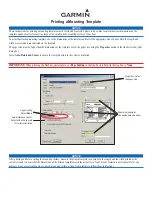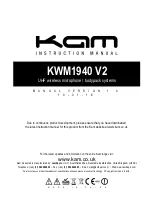For use with a PC (speech recognition or VoIP
telephony/conferencing) the Voice Tracker II can be
placed under or next to the display.
In a conferencing application, it is best to place the Voice
Tracker II on one end of the table with its front pointing
towards the far end.
Voice Tracker II can also be mounted (with an optional
bracket) on walls or on the ceiling to reduce clutter.
To maximize acoustic echo cancellation, use only one
loud speaker, and place it to one side of the Voice
Tracker II.
Talker location signal
Since the Voice Tracker automatica
lly points a “listening
beam” at the loudest talker, it knows the location. This
signal is made available as a digital word through the
DB9 connector (cable is optional).
The RS 232 serial output signal consists of 8 bit words,
no parity, 1 stop bit; commonly referred to as 8,N,1.
Data is between 0 and 250, corresponding to talkers
from the far left in front of the Voice Tracker (0) to the far
right (250). If the talker is directly in front of the Voice
Tracker, the data will read 125.
Note that the Voice Tracker picks up sound from the
behind. So a reading of 125 could mean the talker is
directly in front or directly behind the Voice Tracker.
When the Voice Tracker detects no talker, the location
signal reads 255.
The user will have to create application SW to calibrate
these signals into degrees.
Applications
Speech Recognition
Since the Voice Tracker
TM
operates differently from other
types of microphones or audio input devices, you should
retrain your speech recognition software (enroll a new
user). Be sure to select USB Array Microphone during
the “New User” setup. Personalized vocabulary can
usually be transferred to the retrained “User”.
Conferencing
The Voice Tracker II can be connected to non-PC-based
conferencing systems. Some of the systems require an
XLR (balanced) connection. An inexpensive adapter (like
the Radio Shack 274-017C Adapter/Transformer) can be
used to convert the Voice Tracker II’s unbalanced low
impedance output to
“balanced” XLR.
Meeting Recording
The Voice Tracker II can be connected to a PC with
meeting recording SW, or directly to a handheld digital
recorder using the 3.5 mm analog audio output jack and
wall power supply.
Security Monitoring
The Voice Tracker II can often connect directly to the
microphone input jack of video cameras/dial-up/Internet
transmission systems. Choose the analog output level
that matches the camera requirements.
Trouble Shooting:
Acoustic echo cancellation.
If the ref signal is too strong, AEC will not work well.
The VT II will signal this by blinking the alternate LEDs. If
that happens, reduce the
PC’s speaker output signal.
It should be set to midscale, and volume turned up on
the (external) speaker itself if more loudness is desired.
If the ref signal is too weak, increase it until th
e VT II’s
LEDs start to blink, and then back off the level by 20%
No Audio
Check whether the LEDs track the talker. If not, reboot
(repower). If so, the problem is probably in the computer
setup. Make sure it is looking for recording input where
the Voice Tracker is connected (USB, Mic in, or Line in).
Analog Audio too strong.
Make sure the analog output switch is set to mic level
Analog Audio too weak.
Make sure the analog out switch is set to line level
FCC Compliance
This equipment has been tested and found to comply the
limits for a Class A digital device, pursuant to part 15 of
the FCC rules. These limits are designed to provide
reasonable protection against interference when the
equipment is operated in a commercial environment.
This unit generates, uses and can radiate radio
frequency energy, and if not installed and used in
accordance with the instruction manual, may cause
harmful
interference
with
radio
communications.
Changes or modifications not expressly approved by
Acoustic Magic could void t
he user’s authority to operate
the equipment.
This digital apparatus does not exceed the Class A limits
for radio noise emissions from digital apparatus as set
out in the Radio Interference Regulations of the
Canadian Department of Communications.
35 Peakham Road
Sudbury, MA 01776
www.ACOUSTICMAGIC.com

















